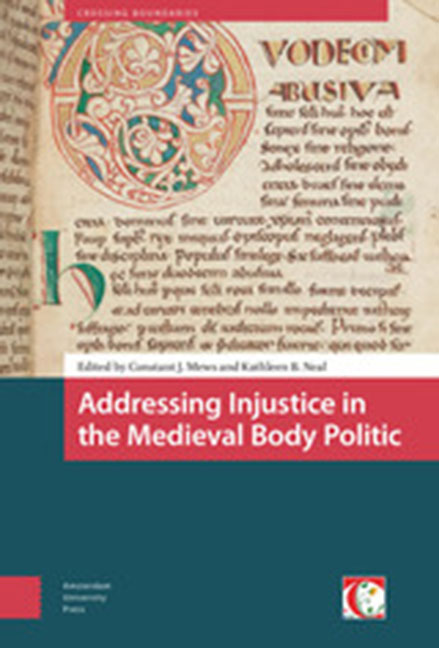Book contents
- Frontmatter
- Contents
- Acknowledgements
- Abbreviations
- Note on References
- List of Tables and Illustrations
- Introduction: Justice and its Abuse in the Medieval Body Politic
- 1 The De XII abusiuis saeculi: Contexts and Textual Traditions
- 2 The Irish Background to the De XII abusiuis saeculi
- 3 ‘Each in the Calling to Which They are Called’: Images of Authority in the De XII abusiuis saeculi
- 4 Transforming Irish Traditions: De XII abusiuis saeculi and Justice in the Frankish World, c. 750–1050
- 5 The Unjust King and the Negligent Bishop: Addressing Injustice in Eleventh and Twelfth-Century England and Germany
- 6 Reflecting on Abuses in Religious Life: From The Twelve Abuses of the Cloister to The Cloister of the Soul
- 7 Preaching the Body Politic: John of Wales and Franciscan Political Thought in the Late Thirteenth Century
- 8 Justice and Its Abuses in the Speculum justiciariorum
- 9 Addressing Abuses and Injustice in the Court of Philip the Fair: The De informatione principum of Durand of Champagne
- 10 ‘Perfect Justice Weighs Everything on a Balanced Scale’: Italian Friars on Equity, the Common Good, and the Commune c. 1270–c. 1310
- 11 Some Late Franciscan Rewritings of the Twelve Abuses
- Appendix: On the Twelve Abuses of the Age A Translation
- Bibliography
- Index of Biblical References
- Index of Manuscripts
- General Index
1 - The De XII abusiuis saeculi: Contexts and Textual Traditions
Published online by Cambridge University Press: 14 February 2024
- Frontmatter
- Contents
- Acknowledgements
- Abbreviations
- Note on References
- List of Tables and Illustrations
- Introduction: Justice and its Abuse in the Medieval Body Politic
- 1 The De XII abusiuis saeculi: Contexts and Textual Traditions
- 2 The Irish Background to the De XII abusiuis saeculi
- 3 ‘Each in the Calling to Which They are Called’: Images of Authority in the De XII abusiuis saeculi
- 4 Transforming Irish Traditions: De XII abusiuis saeculi and Justice in the Frankish World, c. 750–1050
- 5 The Unjust King and the Negligent Bishop: Addressing Injustice in Eleventh and Twelfth-Century England and Germany
- 6 Reflecting on Abuses in Religious Life: From The Twelve Abuses of the Cloister to The Cloister of the Soul
- 7 Preaching the Body Politic: John of Wales and Franciscan Political Thought in the Late Thirteenth Century
- 8 Justice and Its Abuses in the Speculum justiciariorum
- 9 Addressing Abuses and Injustice in the Court of Philip the Fair: The De informatione principum of Durand of Champagne
- 10 ‘Perfect Justice Weighs Everything on a Balanced Scale’: Italian Friars on Equity, the Common Good, and the Commune c. 1270–c. 1310
- 11 Some Late Franciscan Rewritings of the Twelve Abuses
- Appendix: On the Twelve Abuses of the Age A Translation
- Bibliography
- Index of Biblical References
- Index of Manuscripts
- General Index
Summary
Abstract
This chapter considers both the scriptural and patristic influences shaping the core themes of the De XII abusiuis saeculi and the diffusion of its text between the late eighth and sixteenth centuries. It considers how abusio and abusiua, traditionally understood as misuse of words, were expanded in meaning in this work to refer to abusive behaviour. It introduces the literary context of its composition in seventh-century Ireland, before examining the diffusion of the text on the continent, not just through its being quoted in the canon law collection known as Hibernensis, but through being copied as a work of Cyprian (dominant in the Carolingian period) or of Augustine (increasingly common in the twelfth century).
Keywords: Abuses, Grammar, Textual Transmission, Manuscripts, Reform, Political behaviour
The De XII abusiuis saeculi attracted readers throughout the medieval period. Over four hundred manuscripts survive from between the eighth and sixteenth centuries containing either its complete text, excerpts, or simply a list of its numbering of twelve abuses of the age. Between the ninth and eleventh centuries, it circulated mostly under the name of Cyprian of Carthage (d. c. 251), while its attribution to Augustine of Hippo (d. c. 431) became more frequent between the twelfth and fourteenth centuries. In the late fifteenth century, DDAS was printed under both names. Its popularity across the medieval period makes its influence complicated to track. In 1909, Siegmund Hellmann relied mostly on ninth- or tenth-century manuscripts in which DDAS was attributed to Cyprian for his critical edition. In 1988, Aidan Breen argued that a better text was preserved in what he called ‘Class 1’ manuscripts, most from the twelfth century, in which it was often attributed to Augustine, than in those Class 2 and 3 MSS, in which it was assigned to Cyprian. What can we learn from the textual transmission of DDAS about both the original context of its composition and the varying ways in which its authority was asserted? Sketching out the various phases of interest in DDAS, studied in more detail in other chapters in this volume, enables us to map out larger questions about the evolving notions of ‘abuse’ and ‘injustice’ in the medieval period. A case can be made for relating phases of interest in the work to periods of crisis in political or religious life.
- Type
- Chapter
- Information
- Addressing Injustice in the Medieval Body Politic , pp. 35 - 70Publisher: Amsterdam University PressPrint publication year: 2023



